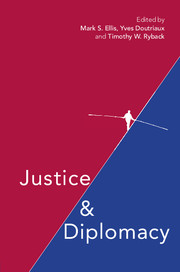 Justice and Diplomacy
Justice and Diplomacy 3 - Compliance
Enforcing International Arrest Warrants Through Diplomacy
Published online by Cambridge University Press: 16 February 2018
Summary
- Type
- Chapter
- Information
- Justice and DiplomacyResolving Contradictions in Diplomatic Practice and International Humanitarian Law, pp. 39 - 63Publisher: Cambridge University PressPrint publication year: 2018


